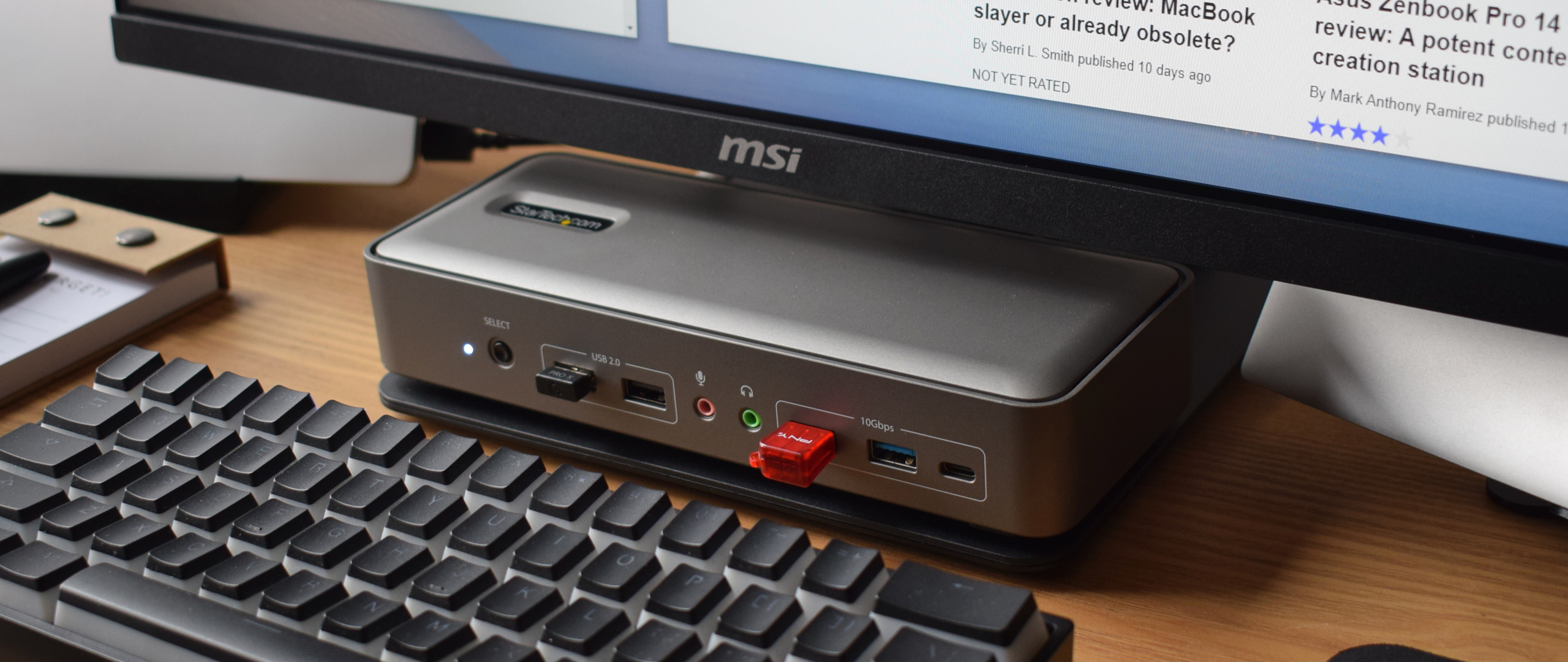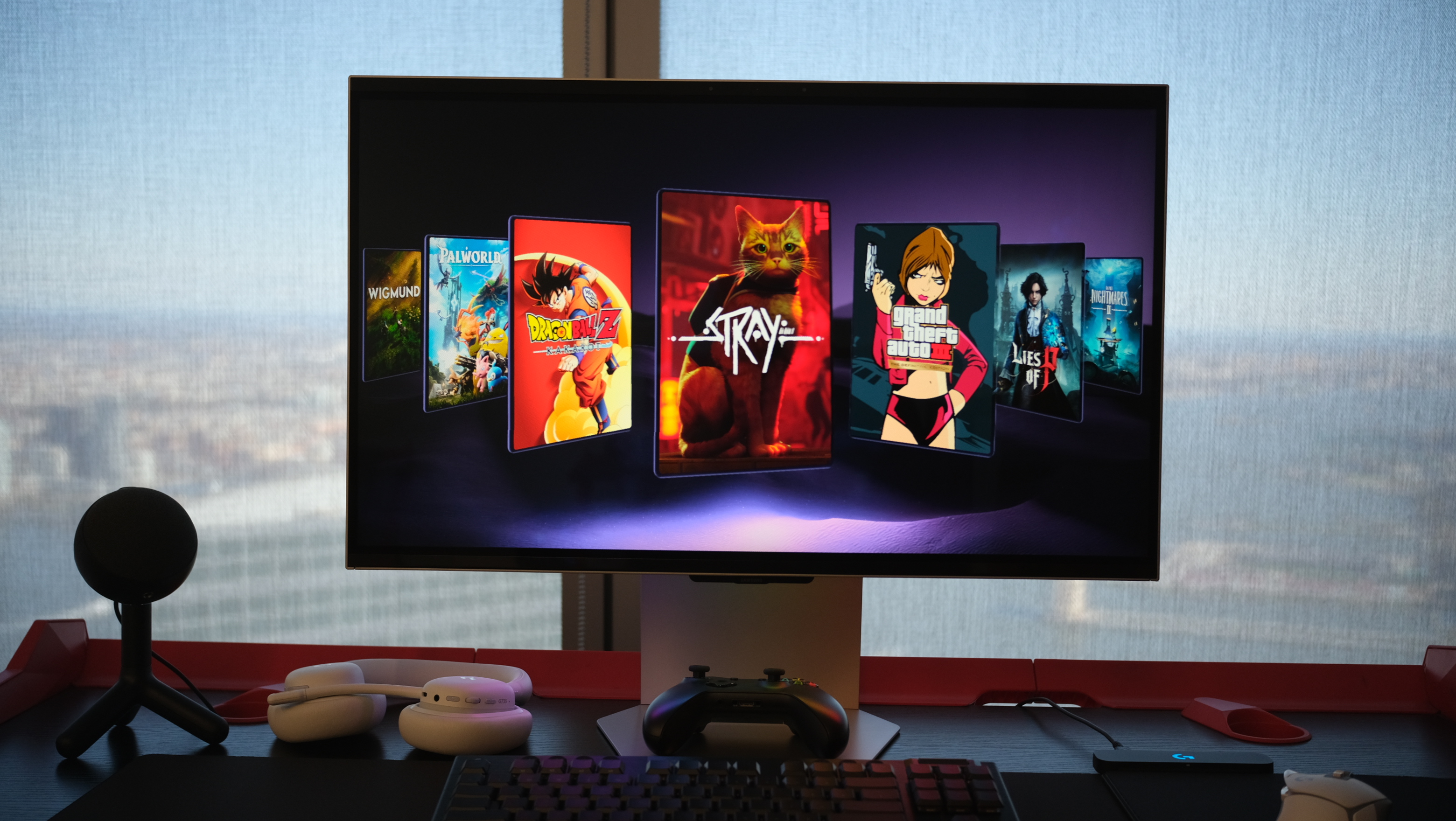Laptop Mag Verdict
This Dual-Laptop USB-C docking station does pretty much exactly what its name implies — offers power and port expansion to two USB-C laptops. However, a humdrum selection of ports results in a dock that’s as inflexible as its tough plastic chassis. Ideal for the workplace, but not much else — Startech’s pricey dock is a ‘strictly business’ affair.
Pros
- +
Dual-host functionality
- +
Impressive 135W total Power Delivery
- +
Sturdy build
- +
Fast host switching
Cons
- -
Very pricey
- -
Middling port selection
- -
Bulky, ugly design
Why you can trust Laptop Mag
The StarTech Dual Laptop USB-C KVM Dock doesn’t give away much from its name, but it’s an impressively useful docking station for those juggling multiple machines. StarTech’s dock lets you switch host devices at the press of a button, reassigning your KVM (keyboard, video, and mouse) to another machine to hit the ground running at a separate workstation.
It’s useful, but it’s also very niche — with this accessory likely shining its brightest in an office or IT setting. It’s with that purpose in mind that I can forgive its unassuming looks, but do the rest of the StarTech Dual Laptop USB-C KVM Docking Station’s features prove that we shouldn’t judge a dock by its cover? Let’s find out.
StarTech Dual-Laptop USB-C KVM Dock: Price and availability
The StarTech Dual-Laptop USB-C KVM Dock is available for a staggering $314.99 from StarTech’s official website or a somewhat less mighty $296.76 from Amazon.
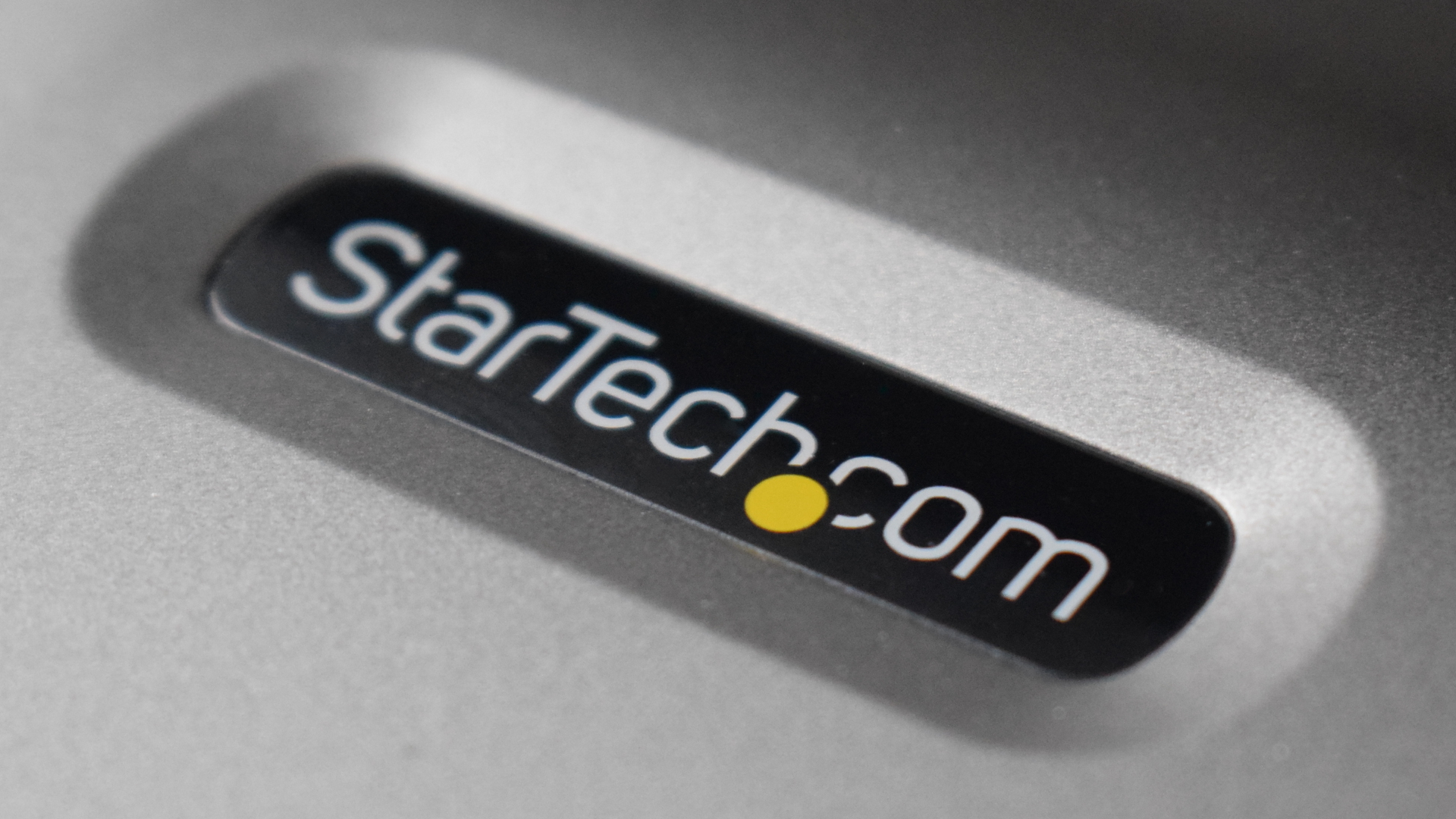
Docking stations can get expensive, but StarTech’s $366 valuation seems absurdly high for what’s on offer. In comparison, you could lay your hands on Plugable’s Thunderbolt 4 & USB4 Quad Display Docking Station — which features more ports at up to four times the speed of StarTech’s dock for just $299.
While its unique dual-host design is handy, I’m not sure I (or anyone) can justify such a steep price tag unless it’s an absolute must-have dock for the task at hand.
StarTech Dual-Laptop USB-C KVM Dock: Design
StarTech’s docking station is not the most appealing-looking accessory I’ve come across. Its bulky, plastic chassis doesn’t inspire much awe, that’s for certain. The large fonts labeling the ports, uninspired chassis, and lack of premium polish don’t leave much room to praise the docking station. However, I do appreciate the rear-facing host ports and color-accurate USB ports.
If it wasn’t for the fact that USB-C came out in 2014, I’d have been happy to believe this was a device from 1997 — at least then I could give it some credit for being silver and not adhering to that awful 90s tech beige.
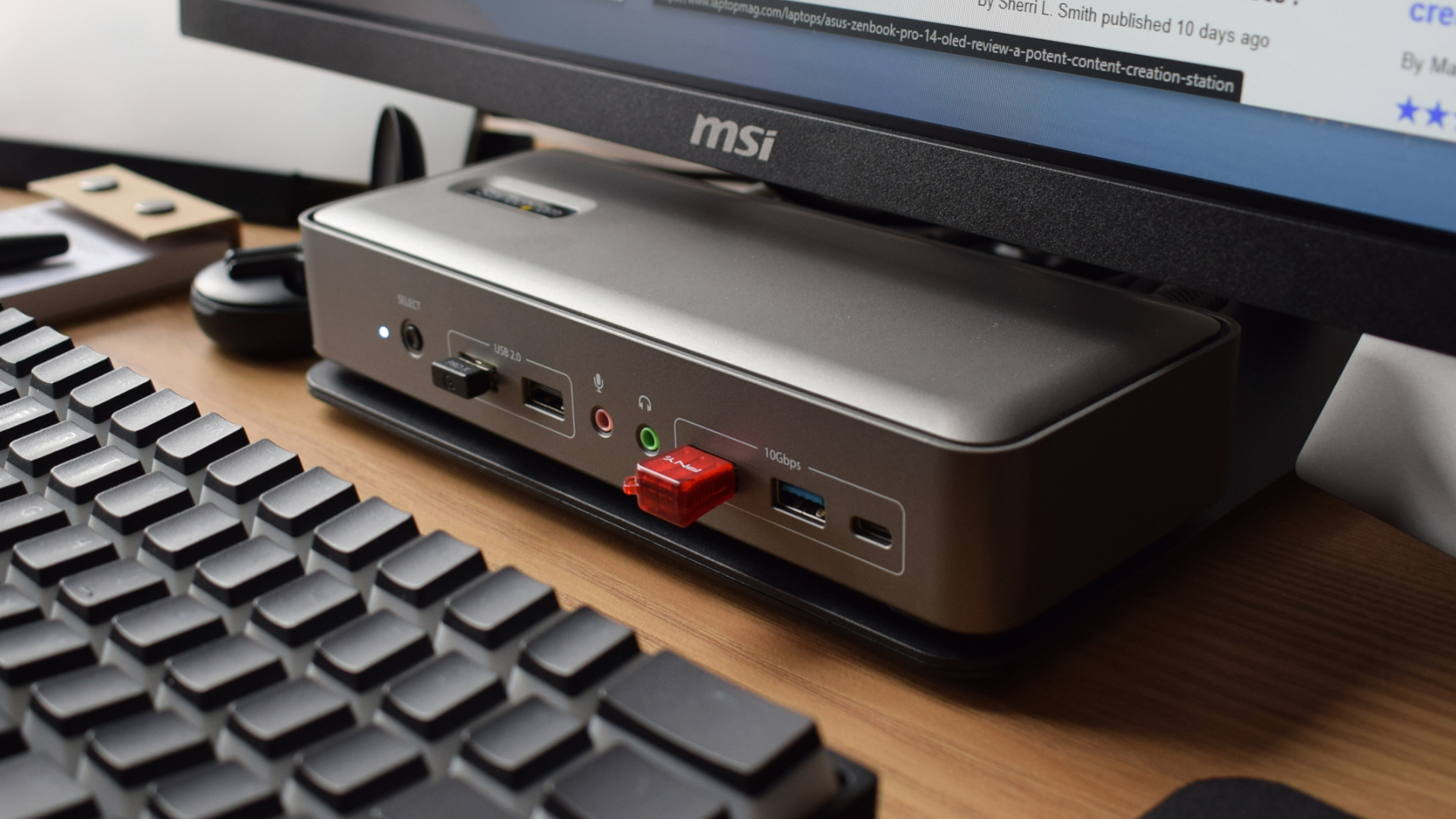
For the number of ports on offer, StarTech’s docking station is fairly large, measuring 8.8 x 3.5 x 1.6 inches in size. That’s a considerable amount of real estate to take up on a desk — especially if you also need to house two laptops side by side. However, that bulk doesn’t translate into weight (likely due to the plastic build) with the dock weighing just 14.2 ounces.
The dock’s light weight isn’t the only benefit of its plastic chassis, as it also proves to be good at managing the device’s overall thermals, with vents along the dock’s base offering more than adequate airflow, too.
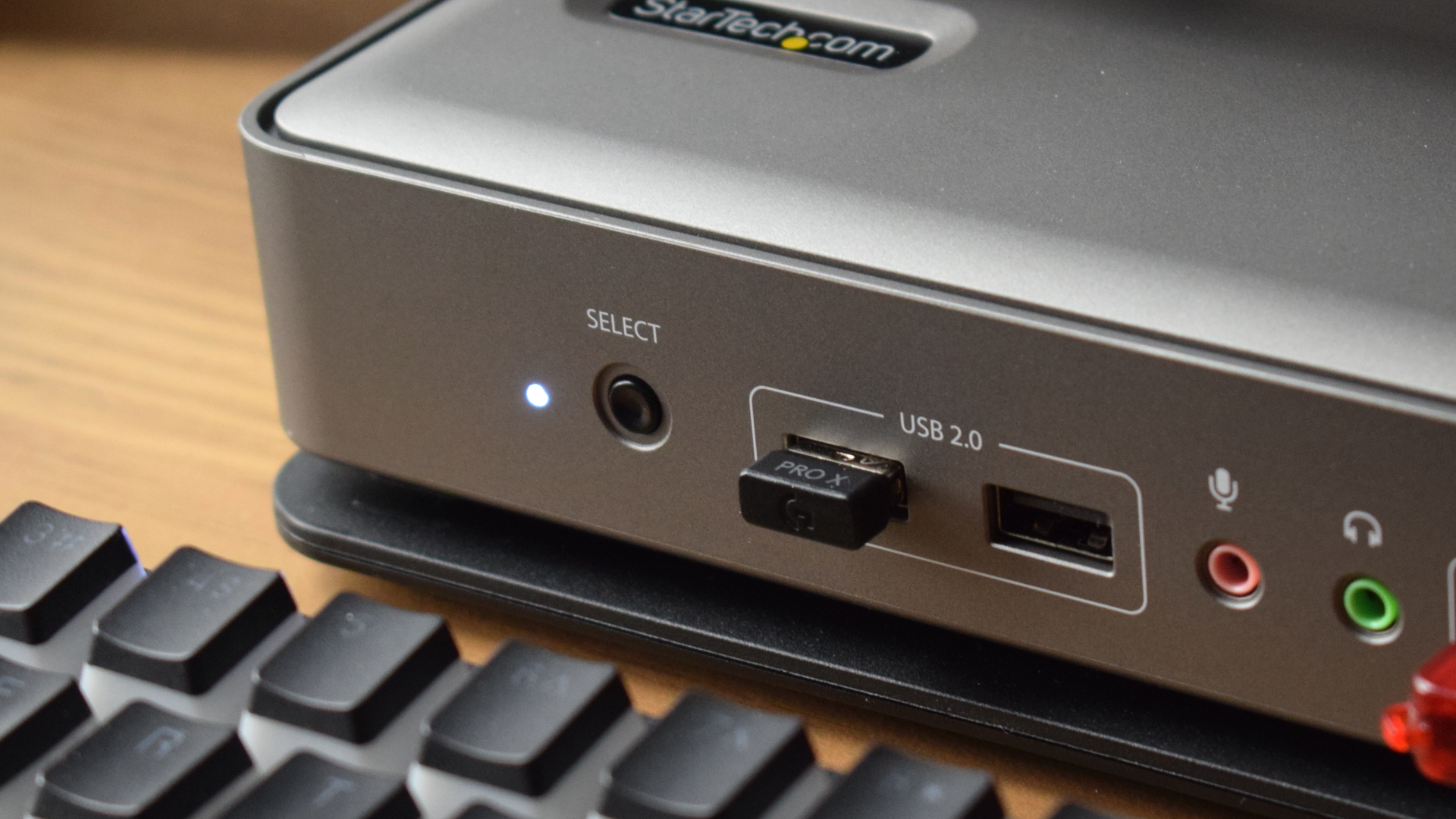
While I couldn’t call it premium, that’s not to say the dock’s chassis is by any means cheap. There are some curves and slopes going on here with the dock’s corners, and a carved edge around the lip of the lid does inspire a deep curiosity in me to see what happens if I wedge a screwdriver in the gap and try to pop the “lid” off to peer inside.
However, I’d have a fairly difficult time with it, considering how sturdy it is. It may be plastic, but it’s bend-resistant, offering next to no flex under pressure, and likely to effortlessly survive any knocks or bumps it may encounter at a busy workstation.
StarTech Dual-Laptop USB-C KVM Dock: Ports and connectivity
StarTech’s dock can play host to two USB-C laptops simultaneously with a combined Power Delivery output of 135W (95W to the active host and 45W to the standby host). Whichever device is currently active will be granted a mix of 10 USB, display, and audio ports to make use of including two DisplayPort 1.4 outputs that can support external monitors at up to 4K resolutions.
Switching devices between primary and standby modes is as simple as pressing the “Select” button on the front of the dock— instantly swapping your standby machine for your primary along with all 10 ports and display outputs. Let’s take a look at those ports in further detail.
The front of the dock features an array of USB and audio ports including:
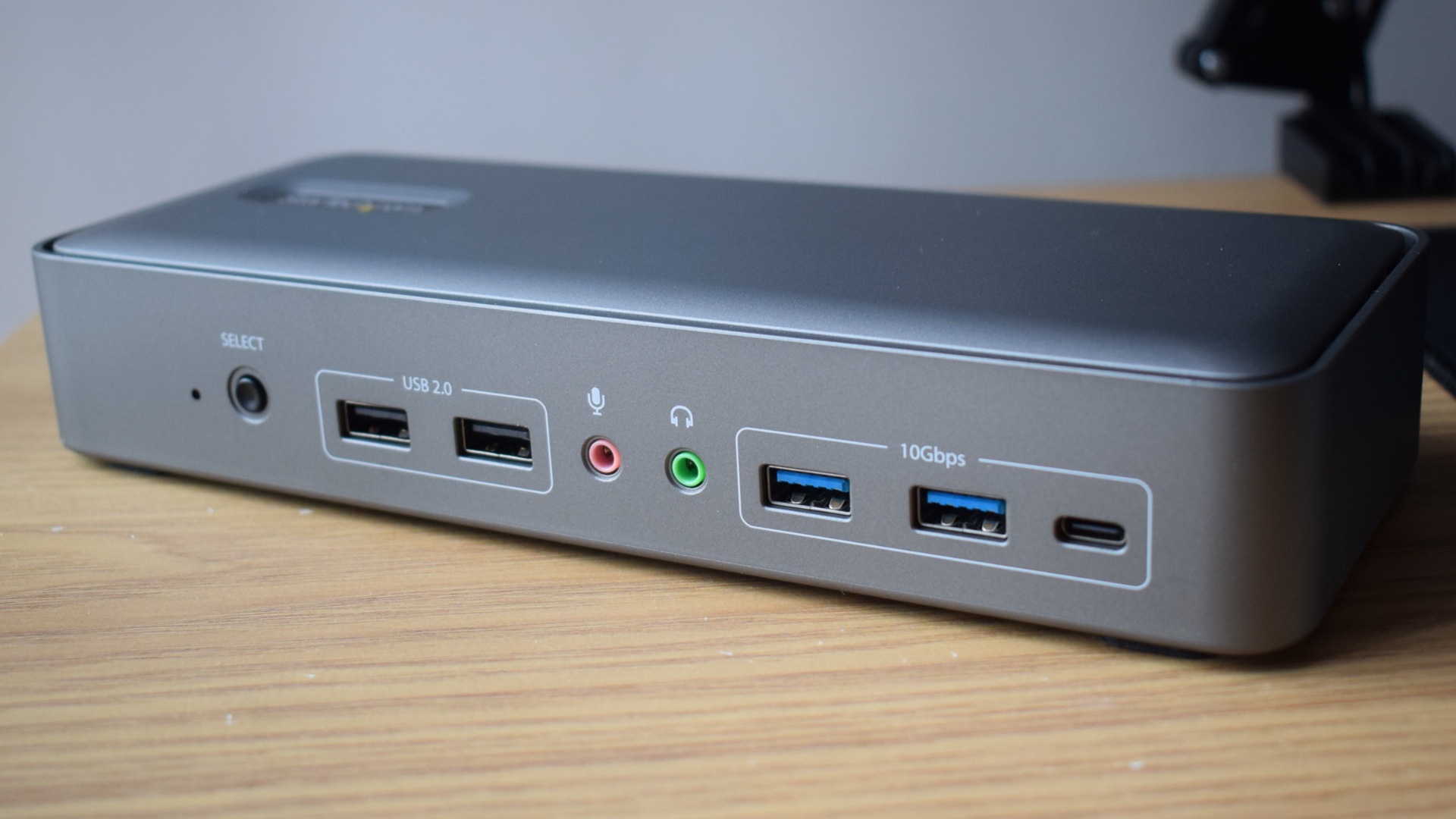
- 1 x Type-C USB 3.2 Gen 2 port (10Gbps)
- 2 x Type-A USB 3.2 Gen 2 ports (10Gbps)
- 2 x Type-A USB 2.0 ports (480Mbps)
- 1 x 3.5mm microphone jack
- 1 x 3.5mm headphone jack
Looking at the rear of the dock, we find the host, power, and display ports including:
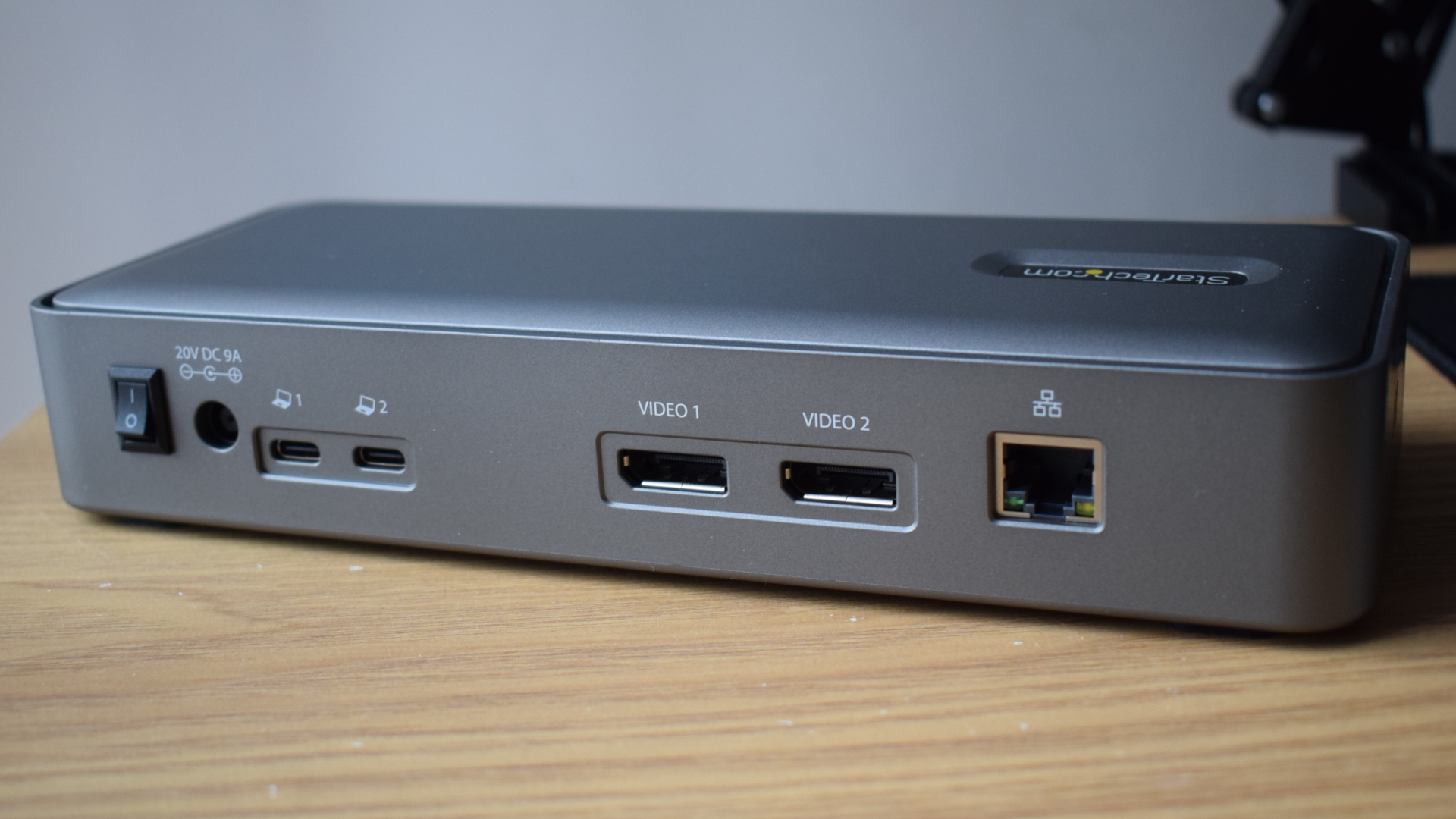
- (Host 1) Type-C USB 3.2 Gen 2 (10Gbps, up to 95W/45W of Power Delivery)
- (Host 2) Type-C USB 3.2 Gen 2 (10Gbps, up to 95W/45W of Power Delivery)
- (Power) DC-in (20V, 9A)
- 2 x DisplayPort 1.4 outputs (supports displays up to 4K@60Hz)
- 1 x Gigabit Ethernet port (RJ45)
StarTech’s dock also features two lock slots on the left-hand side capable of housing Kensington, Noble Wedge, and Nano security locks for increased desktop security.
It’s not a terrible selection of ports, but it’s by no means extensive — lacking SD card readers, non-DisplayPort video solutions, and any front-facing power delivery for charging additional devices such as a phone or tablet. Once again, the Dual-Laptop USB-C dock makes its desired usage abundantly clear, it’s strictly business on this one. No frills, bells, or whistles.
StarTech Dual-Laptop USB-C KVM Dock: Performance
If you’re the multi-machine, multitasking sort then StarTech’s dock offers the invaluable solution of a quick switch button to shift all your peripherals and display back and forth with ease — though you will need to do a bit of prep work first if you’re not using a Windows device. Luckily this is a simple case of navigating to StarTech’s website and downloading the device drivers for a quick install. After which, you’re good to go!
I’ve been making use of StarTech’s Dual-Laptop dock for the better part of a week as I juggle back and forth between my work and personal laptop throughout the day. The dock’s primary feature, allowing me to switch my peripherals back and forth without fiddling with wires, was a blessing. It offered me a quick way to stay on the ball while switching between tasks and machines with ease.
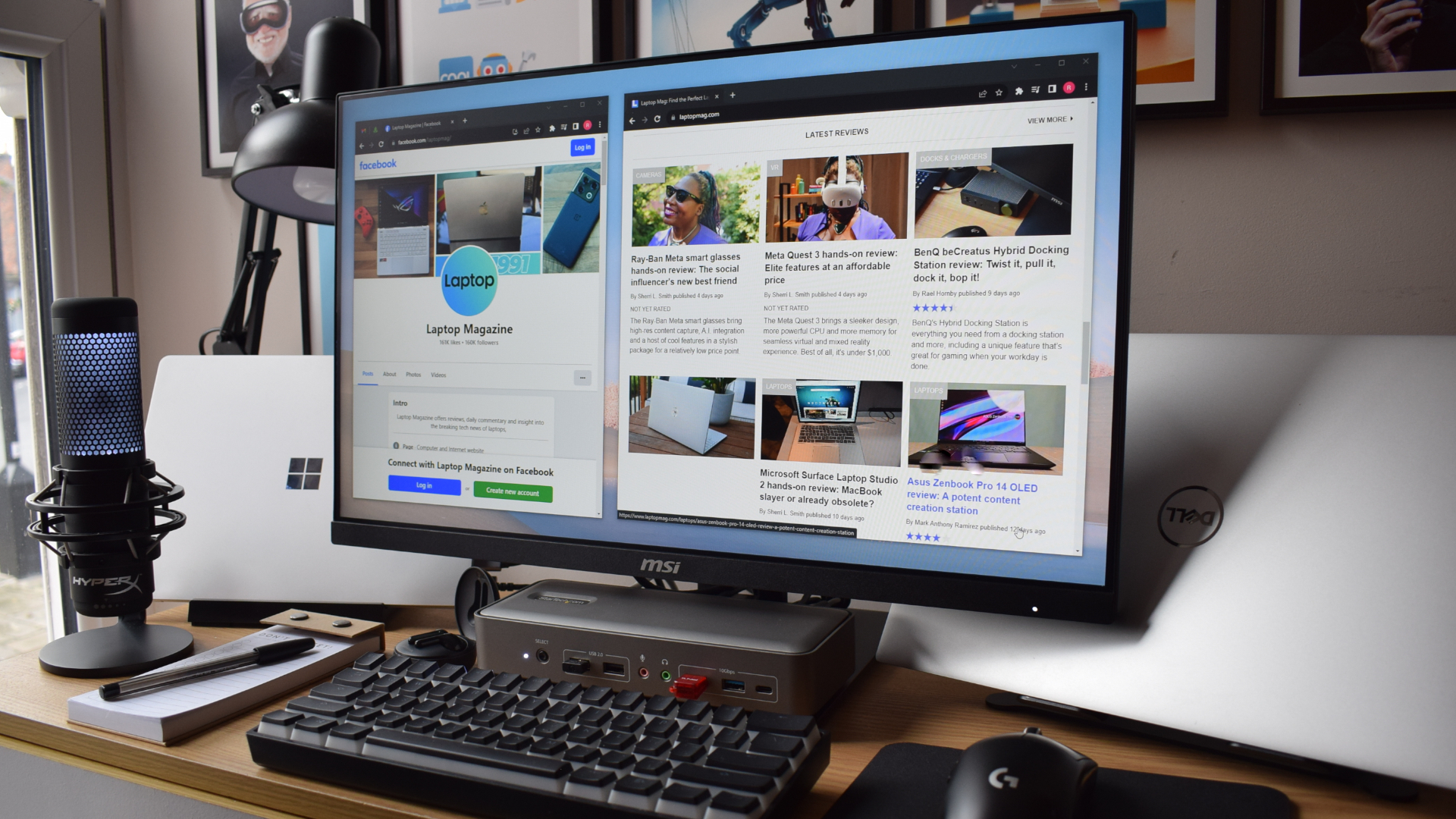
However, I don’t have the biggest of desks, and after a short while, I found fitting everything on my desk at once to be more stressful than anything else. I’d eventually slip back into the habit of ditching my mouse and keyboard entirely to make use of each laptop’s deck instead — instantly diminishing much of what made the StarTech dock so useful.
That being said, I was still able to make use of the dual-host feature to quickly share files between devices by making use of external storage. Loading files onto a drive and hitting the “Select” button at the front of the dock allowed me to instantly retrieve them onto another device without any hassle. It was pretty speedy too thanks to the Type-A USB 3.2 Gen 2 ports at the front of the dock.
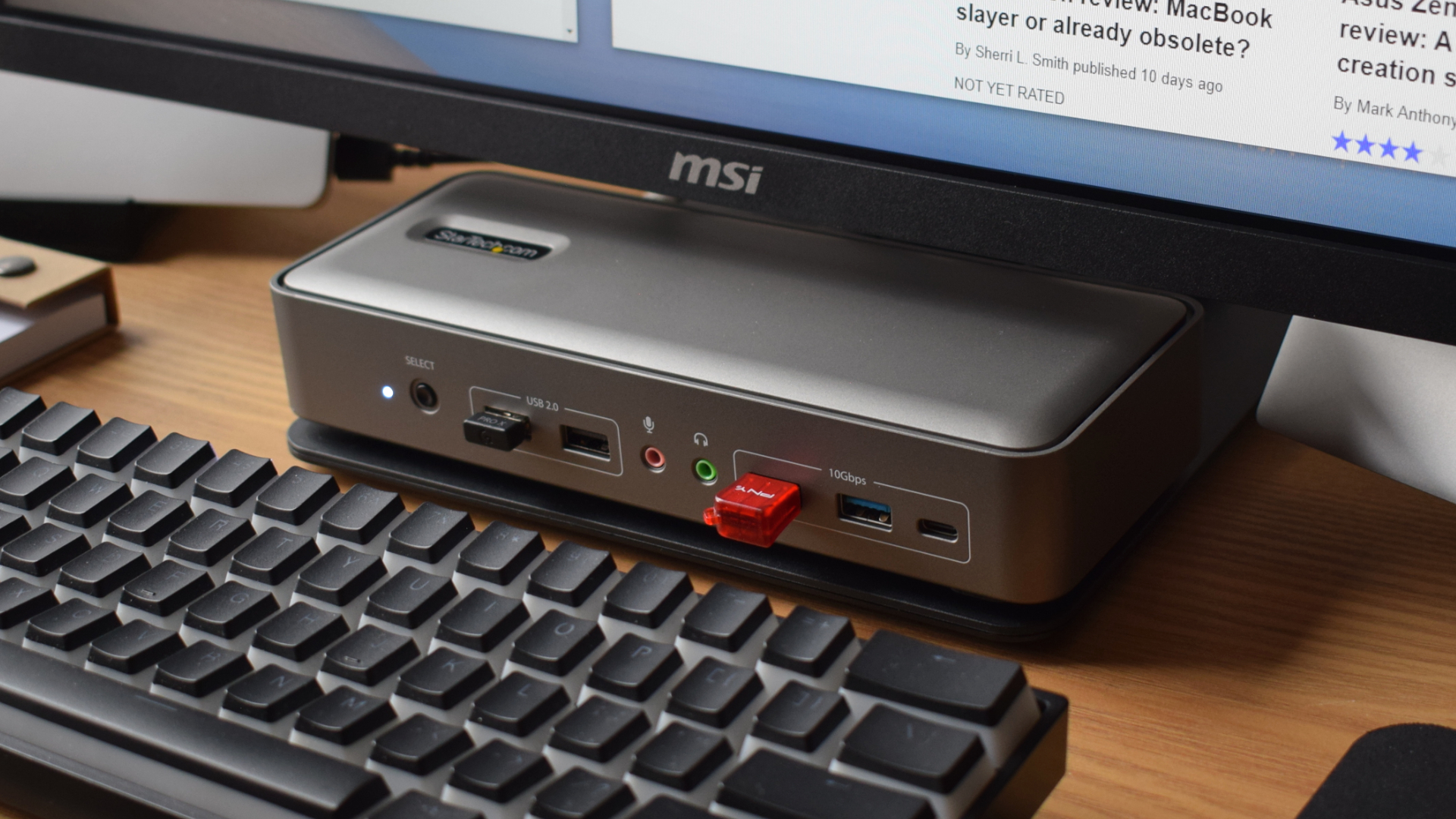
The fact both laptops could be charged at once was one of the most impressive features of StarTech’s dock. I was free to ditch the charging cables entirely, knowing that both my devices could remain topped up throughout the day. While I might’ve ditched the peripherals, I made plenty of use of the dock’s dual-host function to manage which laptop got a sizable charge boost at any one time.
After somehow managing to find the space on my desk to fit a pair of external monitors, I was finally able to test the Dual-Laptop dock’s video output. And everything performed as advertised. Both screens were able to output at 4K with refresh rates of 60Hz. There was no lag or interference to be found with, either, and switching back and forth between laptops was a speedy process that barely registered as a delay in getting things done.
Bottom line
StarTech’s Dual-Laptop USB-C KVM Dock was a pleasure to use, though I wouldn’t have been against using it at a bigger desk in order to make full use of its multi-host functionality — but that’s on me. For the times I did make use of it, it worked flawlessly and proved to be a particularly useful feature when managing a full workstation.
The dock’s notable Power Delivery and support for high-resolution external displays is also worth mentioning. And I’d be remiss not to mention that in spite of the dock’s solid performance, it never became a sweltering mass of scorching plastic. StarTech’s dock consistently maintained comfortable temperatures if I ever needed to grab hold of it to switch out accessories (which, given its dual-laptop design, wasn’t often).
However, the dock’s biggest downfall is in its design and cost. For the price of StarTech’s dock, I’d expect a much faster and more premium-built device in return. Its limited port selection, bulky design, and USB-C limitations make it a difficult sell — but to solve a niche need, it might be the ideal solution for some.

Rael Hornby, potentially influenced by far too many LucasArts titles at an early age, once thought he’d grow up to be a mighty pirate. However, after several interventions with close friends and family members, you’re now much more likely to see his name attached to the bylines of tech articles. While not maintaining a double life as an aspiring writer by day and indie game dev by night, you’ll find him sat in a corner somewhere muttering to himself about microtransactions or hunting down promising indie games on Twitter.
